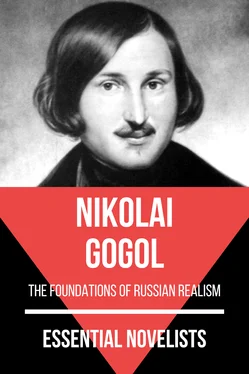Nikolai Gogol - Essential Novelists - Nikolai Gogol
Здесь есть возможность читать онлайн «Nikolai Gogol - Essential Novelists - Nikolai Gogol» — ознакомительный отрывок электронной книги совершенно бесплатно, а после прочтения отрывка купить полную версию. В некоторых случаях можно слушать аудио, скачать через торрент в формате fb2 и присутствует краткое содержание. Жанр: unrecognised, на английском языке. Описание произведения, (предисловие) а так же отзывы посетителей доступны на портале библиотеки ЛибКат.
- Название:Essential Novelists - Nikolai Gogol
- Автор:
- Жанр:
- Год:неизвестен
- ISBN:нет данных
- Рейтинг книги:3 / 5. Голосов: 1
-
Избранное:Добавить в избранное
- Отзывы:
-
Ваша оценка:
- 60
- 1
- 2
- 3
- 4
- 5
Essential Novelists - Nikolai Gogol: краткое содержание, описание и аннотация
Предлагаем к чтению аннотацию, описание, краткое содержание или предисловие (зависит от того, что написал сам автор книги «Essential Novelists - Nikolai Gogol»). Если вы не нашли необходимую информацию о книге — напишите в комментариях, мы постараемся отыскать её.
For this book, the literary critic August Nemo has chosen the two most important and meaningful novels of Nikolai Gogolwhich areDead SoulsandTaras Bulba.
Nikolai Vasilievich Gogol was a Ukrainian-born Russian writer. He contributed to Russian literature through his magnificently crafted dramas, novels and short stories. He was one of the major proponents of the natural school of Russian literary realism.
Novels selected for this book:
– Dead Souls
– Taras Bulba
This is one of many books in the seriesEssential Novelists. If you liked this book, look for the other titles in the series, we are sure you will like some of the authors.
Essential Novelists - Nikolai Gogol — читать онлайн ознакомительный отрывок
Ниже представлен текст книги, разбитый по страницам. Система сохранения места последней прочитанной страницы, позволяет с удобством читать онлайн бесплатно книгу «Essential Novelists - Nikolai Gogol», без необходимости каждый раз заново искать на чём Вы остановились. Поставьте закладку, и сможете в любой момент перейти на страницу, на которой закончили чтение.
Интервал:
Закладка:
“Perhaps you mean Manilovka—not ZAmanilovka?”
“Yes, yes—Manilovka.”
“Manilovka, eh? Well, you must continue for another verst, and then you will see it straight before you, on the right.”
“On the right?” re-echoed the coachman.
“Yes, on the right,” affirmed the peasant. “You are on the proper road for Manilovka, but ZAmanilovka—well, there is no such place. The house you mean is called Manilovka because Manilovka is its name; but no house at all is called ZAmanilovka. The house you mean stands there, on that hill, and is a stone house in which a gentleman lives, and its name is Manilovka; but ZAmanilovka does not stand hereabouts, nor ever has stood.”
So the travellers proceeded in search of Manilovka, and, after driving an additional two versts, arrived at a spot whence there branched off a by-road. Yet two, three, or four versts of the by-road had been covered before they saw the least sign of a two-storied stone mansion. Then it was that Chichikov suddenly recollected that, when a friend has invited one to visit his country house, and has said that the distance thereto is fifteen versts, the distance is sure to turn out to be at least thirty.
Not many people would have admired the situation of Manilov’s abode, for it stood on an isolated rise and was open to every wind that blew. On the slope of the rise lay closely-mown turf, while, disposed here and there, after the English fashion, were flower-beds containing clumps of lilac and yellow acacia. Also, there were a few insignificant groups of slender-leaved, pointed-tipped birch trees, with, under two of the latter, an arbour having a shabby green cupola, some blue-painted wooden supports, and the inscription “This is the Temple of Solitary Thought.” Lower down the slope lay a green-coated pond—green-coated ponds constitute a frequent spectacle in the gardens of Russian landowners; and, lastly, from the foot of the declivity there stretched a line of mouldy, log-built huts which, for some obscure reason or another, our hero set himself to count. Up to two hundred or more did he count, but nowhere could he perceive a single leaf of vegetation or a single stick of timber. The only thing to greet the eye was the logs of which the huts were constructed. Nevertheless the scene was to a certain extent enlivened by the spectacle of two peasant women who, with clothes picturesquely tucked up, were wading knee-deep in the pond and dragging behind them, with wooden handles, a ragged fishing-net, in the meshes of which two crawfish and a roach with glistening scales were entangled. The women appeared to have cause of dispute between themselves—to be rating one another about something. In the background, and to one side of the house, showed a faint, dusky blur of pinewood, and even the weather was in keeping with the surroundings, since the day was neither clear nor dull, but of the grey tint which may be noted in uniforms of garrison soldiers which have seen long service. To complete the picture, a cock, the recognised harbinger of atmospheric mutations, was present; and, in spite of the fact that a certain connection with affairs of gallantry had led to his having had his head pecked bare by other cocks, he flapped a pair of wings—appendages as bare as two pieces of bast—and crowed loudly.
As Chichikov approached the courtyard of the mansion he caught sight of his host (clad in a green frock coat) standing on the verandah and pressing one hand to his eyes to shield them from the sun and so get a better view of the approaching carriage. In proportion as the britchka drew nearer and nearer to the verandah, the host’s eyes assumed a more and more delighted expression, and his smile a broader and broader sweep.
“Paul Ivanovitch!” he exclaimed when at length Chichikov leapt from the vehicle. “Never should I have believed that you would have remembered us!”
The two friends exchanged hearty embraces, and Manilov then conducted his guest to the drawing-room. During the brief time that they are traversing the hall, the anteroom, and the dining-room, let me try to say something concerning the master of the house. But such an undertaking bristles with difficulties—it promises to be a far less easy task than the depicting of some outstanding personality which calls but for a wholesale dashing of colours upon the canvas—the colours of a pair of dark, burning eyes, a pair of dark, beetling brows, a forehead seamed with wrinkles, a black, or a fiery-red, cloak thrown backwards over the shoulder, and so forth, and so forth. Yet, so numerous are Russian serf owners that, though careful scrutiny reveals to one’s sight a quantity of outre peculiarities, they are, as a class, exceedingly difficult to portray, and one needs to strain one’s faculties to the utmost before it becomes possible to pick out their variously subtle, their almost invisible, features. In short, one needs, before doing this, to carry out a prolonged probing with the aid of an insight sharpened in the acute school of research.
Only God can say what Manilov’s real character was. A class of men exists whom the proverb has described as “men unto themselves, neither this nor that—neither Bogdan of the city nor Selifan of the village.” And to that class we had better assign also Manilov. Outwardly he was presentable enough, for his features were not wanting in amiability, but that amiability was a quality into which there entered too much of the sugary element, so that his every gesture, his every attitude, seemed to connote an excess of eagerness to curry favour and cultivate a closer acquaintance. On first speaking to the man, his ingratiating smile, his flaxen hair, and his blue eyes would lead one to say, “What a pleasant, good-tempered fellow he seems!” yet during the next moment or two one would feel inclined to say nothing at all, and, during the third moment, only to say, “The devil alone knows what he is!” And should, thereafter, one not hasten to depart, one would inevitably become overpowered with the deadly sense of ennui which comes of the intuition that nothing in the least interesting is to be looked for, but only a series of wearisome utterances of the kind which are apt to fall from the lips of a man whose hobby has once been touched upon. For every man HAS his hobby. One man’s may be sporting dogs; another man’s may be that of believing himself to be a lover of music, and able to sound the art to its inmost depths; another’s may be that of posing as a connoisseur of recherche cookery; another’s may be that of aspiring to play roles of a kind higher than nature has assigned him; another’s (though this is a more limited ambition) may be that of getting drunk, and of dreaming that he is edifying both his friends, his acquaintances, and people with whom he has no connection at all by walking arm-in-arm with an Imperial aide-de-camp; another’s may be that of possessing a hand able to chip corners off aces and deuces of diamonds; another’s may be that of yearning to set things straight—in other words, to approximate his personality to that of a stationmaster or a director of posts. In short, almost every man has his hobby or his leaning; yet Manilov had none such, for at home he spoke little, and spent the greater part of his time in meditation—though God only knows what that meditation comprised! Nor can it be said that he took much interest in the management of his estate, for he never rode into the country, and the estate practically managed itself. Whenever the bailiff said to him, “It might be well to have such-and-such a thing done,” he would reply, “Yes, that is not a bad idea,” and then go on smoking his pipe—a habit which he had acquired during his service in the army, where he had been looked upon as an officer of modesty, delicacy, and refinement. “Yes, it is NOT a bad idea,” he would repeat. Again, whenever a peasant approached him and, rubbing the back of his neck, said “Barin, may I have leave to go and work for myself, in order that I may earn my obrok [9]?” he would snap out, with pipe in mouth as usual, “Yes, go!” and never trouble his head as to whether the peasant’s real object might not be to go and get drunk. True, at intervals he would say, while gazing from the verandah to the courtyard, and from the courtyard to the pond, that it would be indeed splendid if a carriage drive could suddenly materialise, and the pond as suddenly become spanned with a stone bridge, and little shops as suddenly arise whence pedlars could dispense the petty merchandise of the kind which peasantry most need. And at such moments his eyes would grow winning, and his features assume an expression of intense satisfaction. Yet never did these projects pass beyond the stage of debate. Likewise there lay in his study a book with the fourteenth page permanently turned down. It was a book which he had been reading for the past two years! In general, something seemed to be wanting in the establishment. For instance, although the drawing-room was filled with beautiful furniture, and upholstered in some fine silken material which clearly had cost no inconsiderable sum, two of the chairs lacked any covering but bast, and for some years past the master had been accustomed to warn his guests with the words, “Do not sit upon these chairs; they are not yet ready for use.” Another room contained no furniture at all, although, a few days after the marriage, it had been said: “My dear, to-morrow let us set about procuring at least some TEMPORARY furniture for this room.” Also, every evening would see placed upon the drawing-room table a fine bronze candelabrum, a statuette representative of the Three Graces, a tray inlaid with mother-of-pearl, and a rickety, lop-sided copper invalide. Yet of the fact that all four articles were thickly coated with grease neither the master of the house nor the mistress nor the servants seemed to entertain the least suspicion. At the same time, Manilov and his wife were quite satisfied with each other. More than eight years had elapsed since their marriage, yet one of them was for ever offering his or her partner a piece of apple or a bonbon or a nut, while murmuring some tender something which voiced a whole-hearted affection. “Open your mouth, dearest”—thus ran the formula—“and let me pop into it this titbit.” You may be sure that on such occasions the “dearest mouth” parted its lips most graciously! For their mutual birthdays the pair always contrived some “surprise present” in the shape of a glass receptacle for tooth-powder, or what not; and as they sat together on the sofa he would suddenly, and for some unknown reason, lay aside his pipe, and she her work (if at the moment she happened to be holding it in her hands) and husband and wife would imprint upon one another’s cheeks such a prolonged and languishing kiss that during its continuance you could have smoked a small cigar. In short, they were what is known as “a very happy couple.” Yet it may be remarked that a household requires other pursuits to be engaged in than lengthy embracings and the preparing of cunning “surprises.” Yes, many a function calls for fulfilment. For instance, why should it be thought foolish or low to superintend the kitchen? Why should care not be taken that the storeroom never lacks supplies? Why should a housekeeper be allowed to thieve? Why should slovenly and drunken servants exist? Why should a domestic staff be suffered in indulge in bouts of unconscionable debauchery during its leisure time? Yet none of these things were thought worthy of consideration by Manilov’s wife, for she had been gently brought up, and gentle nurture, as we all know, is to be acquired only in boarding schools, and boarding schools, as we know, hold the three principal subjects which constitute the basis of human virtue to be the French language (a thing indispensable to the happiness of married life), piano-playing (a thing wherewith to beguile a husband’s leisure moments), and that particular department of housewifery which is comprised in the knitting of purses and other “surprises.” Nevertheless changes and improvements have begun to take place, since things now are governed more by the personal inclinations and idiosyncracies of the keepers of such establishments. For instance, in some seminaries the regimen places piano-playing first, and the French language second, and then the above department of housewifery; while in other seminaries the knitting of “surprises” heads the list, and then the French language, and then the playing of pianos—so diverse are the systems in force! None the less, I may remark that Madame Manilov—
Читать дальшеИнтервал:
Закладка:
Похожие книги на «Essential Novelists - Nikolai Gogol»
Представляем Вашему вниманию похожие книги на «Essential Novelists - Nikolai Gogol» списком для выбора. Мы отобрали схожую по названию и смыслу литературу в надежде предоставить читателям больше вариантов отыскать новые, интересные, ещё непрочитанные произведения.
Обсуждение, отзывы о книге «Essential Novelists - Nikolai Gogol» и просто собственные мнения читателей. Оставьте ваши комментарии, напишите, что Вы думаете о произведении, его смысле или главных героях. Укажите что конкретно понравилось, а что нет, и почему Вы так считаете.












